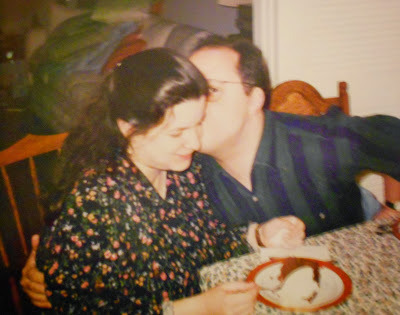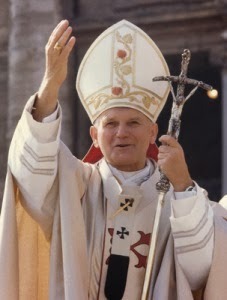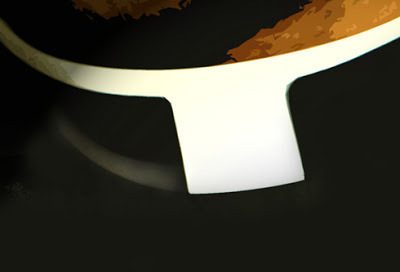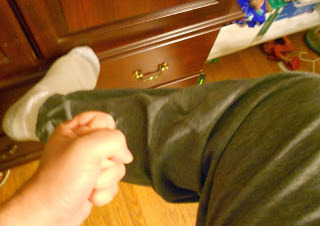John Janaro's Blog, page 289
October 28, 2013
Dear Eileen: What a Glorious Life
 The engaged couple, Christmas 1995
The engaged couple, Christmas 1995Eighteen years ago today
I got engaged to my beautiful lady.
And now, looking at all the time,filled with love and patienceand five precious, mysterious children,with arduous work and failure and success,with not much richer and mostly poorer,and even with illness and pain,there is only one thing I can say: "What a glorious life we've had!" I am so grateful to God and to you, Eileen Janaro.I love you!May we always be together,and continue to share with tenderness and couragewhatever God asks of us.
Published on October 28, 2013 17:30
October 26, 2013
The Ancient Blog: Why Were All Things Bitter on the Tongue?
Paging through the Ancient Blog from the month of October in the year One Thousand Nine Hundred and Ninety (yes, that's 1990) I came across some scattered entries for the month, such as this page:

Hmmm. Edith Stein quotations have lost none of their vividness.
Television was "raising the kids" in 1990. The Box was indeed at its height. Cable was booming with new networks, and everyone had VCRs and at least one membership card to a video rental store. Of course, by 1990 we also had personal computers in our homes. They were planted on desks, and looked like bulky microwave ovens. They were useful for documents and data, but they weren't much fun. In those days, the television and the computer occupied two entirely separate worlds, and there was no reason to imagine that that would ever change. As for phones... well, they were your house, securely plugged into the wall.
TV was king. In a few months, Americans would get to watch their first "live war." Thanks to CNN, the bombing of Baghdad was brought into our living rooms like a football game. They even designed a eye-catching logo for "the Gulf War." TV was shaping all of us. It was defining the stories with its images. Upstart cable stations and poor quality homemade video tapes hinted at the possibility of "alternative media," but not much....
What about John Janaro in 1990? I was doing well in graduate school. "But I am not happy. I am not content. I am not satisfied." I was 27 and I thought that "all things [were] bitter on the tongue."
For all that has happened in recent years -- all the struggles and breakdowns and failures -- I would not describe my life today as "bitter on the tongue." No. It is a great life. Things are not bitter. Arduous and difficult, yes. But not bitter. It is a great thing to be alive, and to have hope for each day.
Perhaps in some ways I've grown younger with the passing of years.

Hmmm. Edith Stein quotations have lost none of their vividness.
Television was "raising the kids" in 1990. The Box was indeed at its height. Cable was booming with new networks, and everyone had VCRs and at least one membership card to a video rental store. Of course, by 1990 we also had personal computers in our homes. They were planted on desks, and looked like bulky microwave ovens. They were useful for documents and data, but they weren't much fun. In those days, the television and the computer occupied two entirely separate worlds, and there was no reason to imagine that that would ever change. As for phones... well, they were your house, securely plugged into the wall.
TV was king. In a few months, Americans would get to watch their first "live war." Thanks to CNN, the bombing of Baghdad was brought into our living rooms like a football game. They even designed a eye-catching logo for "the Gulf War." TV was shaping all of us. It was defining the stories with its images. Upstart cable stations and poor quality homemade video tapes hinted at the possibility of "alternative media," but not much....
What about John Janaro in 1990? I was doing well in graduate school. "But I am not happy. I am not content. I am not satisfied." I was 27 and I thought that "all things [were] bitter on the tongue."
For all that has happened in recent years -- all the struggles and breakdowns and failures -- I would not describe my life today as "bitter on the tongue." No. It is a great life. Things are not bitter. Arduous and difficult, yes. But not bitter. It is a great thing to be alive, and to have hope for each day.
Perhaps in some ways I've grown younger with the passing of years.
Published on October 26, 2013 20:30
October 24, 2013
Can God Really Turn Our Sorrows Into Joy?
 "With weeping they shall come,
"With weeping they shall come,and with consolations I will lead them back,
I will let them walk by brooks of water,
in a straight path in which they shall not stumble.
I will turn their mourning into joy,
I will comfort them, and give them gladness for sorrow."
(Jeremiah 31:9, 13)
The promise of the Lord is to lead us, to transform our mourning and our sorrow, to bring us joy and gladness in Him. "I will turn their mourning into joy." But how can this possibly happen?
Sorrow is like a wound forever opened, and we mourn over what is lost beyond all recovery. Can this really change? The really deep sorrows, like the tragic loss of someone we love... how can these sorrows be turned into joy?
We really don't understand what this means. These are the sorrows that we make a certain kind of "peace" with, after awhile. The world tells us to "move on with life" and to forget, and in sense we have to do this, we have to "carry on" just to survive. But no one really forgets the deep sorrows. We learn to carry them with us. We find a way to "come to terms" with them. We live with open wounds.
But if we really have faith in the promise of the Lord, then we also have something more. We have hope. In faith and in hope, we know that God has made our sorrows His own. He has borne them all the way to the end.
God has revealed His love for us. God is Love.
God has revealed His infinite glory, His infinite mystery. But after 20 centuries of Christianity, the words "God is Love" can sound sentimental. We want "love" to be trivial, and so we make God trivial. We consign Him to the superficial places, to the margins of life. We keep His love at a distance, as though it were some vague comforting story.
We do not want to think about real love, because it is so fundamental and mysterious, because it encompasses sacrifice, and because our human experience of love is so often one of failure, limitations, and disappointment. And love is so often for us the road to sorrow.
We love someone, and then they die.
How can we bear this? We envision a hazy "afterlife," strange and inaccessible, or else we allow them to disappear into a supercosmic nirvana. But in life we knew a human person, someone we could walk with, by brooks of water. Here is our great sorrow: we want to walk again with the person we love. We want to see two pairs of feet, and instead we only see one. We walk alone.
And then, a stranger appears.
He walks with us. We don't know who the stranger is, but hope is awakened within our hearts. Are we willing to follow that hope, and take the stranger into the home of our hearts? Or will we let him pass by?
Only if we let the stranger in will he open our eyes. He will show us that he has all the deep wounds of our sorrows. He has them.
But there is no easy way to learn this. We have to let the stranger in. We have to see His humanity and let the fire of hope burn in us.
Then we will begin to discover that the promise has been fulfilled, that love is not a lie or a trick, that our sorrow is even now being turned to joy.
Published on October 24, 2013 20:33
October 23, 2013
Why Are We Always So Frustrated?

Everything is grace, Everything is the direct effect of our Father's love. Everything is grace, because everything is God's gift....
--St. Therese of Lisieux
Everything? Really??
Okay, I can do the theology here, but when it comes to actual stuff that happens ... its very hard to see everything as a gift. Sometimes "everything" is a train wreck. Where is the "gift"?
At such times, it seems easier to understand that proverb of contemporary worldly wisdom, which might be paraphrased as: "Life stinks and then you die!"
But no. Those are always words of profound dissatisfaction. The human person knows they are wrong. If there is any "resignation" in them, its only in the attempt to make a cynical peace with the idea that the universe is one big scam.
But I can't say "I've been cheated by life" except from the expectation that life is supposed to give me something, that at the heart of life there is a promise.
Thus, people go on hoping for something, and if they say things like this its because they are trying to cope with a sense of frustration that seems to renew itself over and over again.
I usually don't go so far as to say that "life stinks..." (well, not lately anyway). But I do feel that "life is often frustrating."
How can my frustration be a gift? Why do I have to live with frustration, day after day; dull, throbbing frustration aching through the day; frustration like a prison that seems to build walls in every direction? What's the "gift" in that?
Well, frustration provokes me; it challenges my freedom, and my sense of who I am.
In the face of frustration, I can choose to give up. I can say "life stinks" and wallow in pity for my isolated self.
Or I can remember that my very self is a gift, and that this moment of frustration (with all of its bitterness, pain, and incomprehensibility) is a gift because it deepens my awareness of who I really am. It reminds me in a concrete way that I am made for something greater, something beyond my control, something I don't make or measure or manage, something that I can't find anywhere in this world.
Nevertheless, this "something" is real. It is at the root of me, it sustains me, and it carves itself into my heart in the form of a promise.
************************
What does my six year old daughter do when she's frustrated by something?
"Daddy, Daddy, Daddy, Daddy! Help! Please help!" She asks for help. She asks Daddy to come.
What do I do if I see Josefina crying, helpless, frustrated by something because she's just too small to understand it?
I go to her and pick her up and hold her. She still cries. Sometimes she cries even more. It seems like she doesn't even notice I'm there.
But I am there, and I keep holding on to her.
Published on October 23, 2013 19:00
October 22, 2013
John Paul II: Opening Wide the Doors For Christ
 Pope John Paul II at his installation,
Pope John Paul II at his installation,October 22, 1978It has begun to seem like a long time ago. The world was different in many ways. It was the world of the Iron Curtain and the Berlin Wall; the world of unimaginable stockpiles of nuclear weapons, the world of "mutually assured destruction." It was the world that had risen from the ashes of two horrible wars, the vast explosion of technological power, and the emergence of peoples and nations struggling to affirm their own identity.
It was the world of my youth. The Communist Empire of the Soviet Union seemed indestructible, an awful reality that appeared to be one of the permanent fixtures of the wild and scary new epoch that was emerging. There were no great ideals looming on the horizon (at least none that I was aware of). There was (it seemed) only the exponential growth of human power over the external world. But human hearts were full of strange dreams and empty of God. He was ignored or had been forgotten by the "free" world, and He was banned by communism.
On October 22, 1978, the sun rose on a dark and terrible world. Who could imagine that something new might happen? Who would have guessed that this day would inaugurate the beginning of a great energy, an expression of intelligence, and above all a witness that was destined to leave an ineradicable stamp on the emerging epoch? No one had predicted that the greatest man of the 20th century was about to take the stage of history. A man was about to appear who would help us begin to understand what had happened in these tumultuous decades of colossal growth and vast destruction. He would help us understand the continuing changes at the end of the second millennium. He would point the way forward, open new vistas of understanding and affectivity, and above all he would remind us of the love of God.
The greatness of John Paul II, of course, was his witness to Christ. It was a singularly powerful witness. He entered into so many realms of human experience and endeavor only to efface himself so that Christ might shine through him. We learned that Christ had never left us, and that at the beginning of the third millennium it was Christ who alone was sufficient to subordinate the new power of human beings to a new and deeper awareness of their dignity as children of God.
The feast day of the man who will soon be St. John Paul II commemorates a moment in his own life and in the life of the Church, but also a decisive moment for the history of the world. There were some who heard his words that day and recognized that something great had begun. There were some who, on that day, began to discover a new courage in their lives.
"Do not be afraid.
Open, I say open wide the doors for Christ.To His saving poweropen the boundaries of states,economic and political systems,the vast fields of culture,civilization and development.Do not be afraid.Christ knows 'that which is in man.'He alone knows it.
"So often today,man does not know that which is in him,in the depths of his mind and heart.So often he is uncertainabout the meaning of his life on this earth.He is assailed by doubt,a doubt which turns into despair.We ask you, therefore,we beg you with humility and with trust, let Christ speak to man. He alone has words of life,yes, of life eternal."
Blessed John Paul IIOctober 22, 1978
Published on October 22, 2013 20:32
October 18, 2013
Mental Illness Happens to "Good Priests" Too

A week and a half ago, I received some terrible news. It saddened and shocked many people. It saddened me, very deeply. But it didn't shock me.
"Father X, a local priest, died unexpectedly yesterday...." So begins an obituary. Some people don't need to read any further to realize the awful thing that has happened. But in a few days, it becomes common knowledge.Another priest has died by suicide.
This was not a priest who abused anyone, or was under any accusation, or who had ever even dreamed of committing a crime. This was a priest who suffered from depression.
Lord Jesus, grant him eternal rest, and console his family, his friends, his parish, his brother priests. Jesus, have mercy on him, and on the souls of other priests who have disappeared in this darkness, and all other people driven to such an end. Have mercy on those who are afflicted by this terrible disease, and by every oppressive suffering. Jesus, have mercy on us and on the whole world. Jesus.I don't know what to say about this on a blog. I've prayed to God; I've asked Him, "What can I say?" Does God want me to say anything at all? Maybe it would be better to remain silent.
This is a time to mourn.
But it is also a time for vigilance. A time to pray for the dead and the living. And also a time to do whatever we can to fight against the stigma that remains attached to mental illness, and to build up adequate, Catholic, Christian, human ways to reach out to people who suffer from mental illness. Let us face the fact: we do not yet have enough of these resources. We're not even close. This must change!
Priests are also human beings. They have brains. They have emotions. They have human problems, human suffering, human loneliness, human illnesses. There are plenty of good priests who suffer from mental illnesses. They struggle with them, they find ways to get through the day with them, they limp with them. They are good men -- some of the best men I've ever known, men who have been instruments of Christ's grace for many, men who have never been a threat or a danger to anyone. Except themselves.
Mental illnesses are diseases. For some reason, we still tend to assume that the sacrament of Holy Orders makes men immune from these diseases. It doesn't.
But what can any of us do? How do we help with a problem like this? Its too enormous. We feel powerless. What can we do?
We can pray for our priests, living and dead. We can have greater compassion toward them (and toward one another). We can recognize that these mental illnesses are real, and try to understand them. We can support efforts to build up adequate mental health services for priests and for everyone in our dioceses.
We can encourage and support Catholic men and women who feel called to be psychiatrists, psychologists, therapists, mental health care practitioners, researchers, neuroscientists, and health journalists. We can stop mocking these professions and stop showing contempt for the real problems they are grappling with. Yes, there is a lot of error and confusion here, but also a lot of positive accomplishments and a lot of real medical and therapeutic treatments that exist and that continue to be developed. We must recognize these things; it is a matter of justice and mercy, of life and death.
We can think more carefully, make the appropriate distinctions, listen to people whose judgment we trust, and build up what is good here. Let us help our priests, other people, and ourselves to find the genuine healing that is available. Let us work to erase the stigma and the shame that cause so many people to live in denial or hide the reality of their pain.
We can try to remember that every human being is a person--and that means my neighbor, my spouse, my child, my colleague, and also my priest and my bishop. Every human being is a person who needs to be loved and appreciated, who is vulnerable and weak, afflicted and wounded by sickness and sin and the inexhaustible thirst for God.
We can learn to look at the person. Love the person, first, always....
Published on October 18, 2013 11:45
October 14, 2013
She Understands My Heart
 Yesterday Pope Francis renewed the consecration of the world to the Immaculate Heart of Mary. The statue of Our Lady of Fatima was brought from Portugal to Rome for this simple but beautiful moment.
Yesterday Pope Francis renewed the consecration of the world to the Immaculate Heart of Mary. The statue of Our Lady of Fatima was brought from Portugal to Rome for this simple but beautiful moment.There was something about this iconic statue that struck me powerfully as I watched the Mass yesterday morning. This is the statue that bears in its crown the extraordinary relic of another Pope who will be canonized next Spring. The bullet that carried the future of the Church and the human race in its flight is now a jewel in Mary's crown.
Pope Francis knows that the Mother of God is our mother, that she is the "untier of knots," all the knots that bind us up inside ourselves, and keep our hearts from growing.
The heart is a mystery. I think it is a place where Mary is especially important.
Mary is the Woman. "Be it done unto me according to your word." Her submission, from her heart, is the beginning of everything.
She understands my heart. She knows how I struggle with "sub-mission," with saying YES to God and allowing Him to draw my freedom into the His Great Mission -- the giving of Himself, the pouring-out of Himself in love. I compromise, complicate things, evade, resist! I tie myself into knots.
Mary unties the knots. I have to let her take care of it. She has a patience and a compassion in her heart that has been given to her precisely to accompany me, as my mother. She has the supreme empathy for my destiny. This is true for each and every one of us.
Thus the Pope knows that it is meaningful to consecrate the world once again to Mary's Immaculate Heart.
Why would he do this if she's not really there, or if she doesn't matter or doesn't help?
Mary is not a doctrine to be puzzled over. She's a real person, she's really there, she's our mother, she cares for us, she helps us, she loves us... and we don't have to understand "why" in order to go to her.
Either she is a real person who hears the Pope's prayers, and your prayers and my prayers, or else WHY BOTHER WITH ANY OF THIS AT ALL?
My heart? Its a mess. It doesn't want to submit. It doesn't know how to open up, to let go of its smallness, to receive a gift greater than itself, and be transformed by sharing in God's infinite love. My heart is proud. My heart is afraid. My heart is petty.
I give it to Mary. "Mother Mary, untie the knots."
Published on October 14, 2013 19:08
October 11, 2013
Give Thanks
 "In all circumstances
give thanks,
for this is the will of God for you
in Christ Jesus"
(1 Thessalonians 5:18).
"In all circumstances
give thanks,
for this is the will of God for you
in Christ Jesus"
(1 Thessalonians 5:18)."Giving thanks" in a time of difficulty does not mean trying to force myself to feel good about it. It means trusting in God's goodness and love for me in this moment.
Published on October 11, 2013 07:00
October 8, 2013
"What I Wore on Monday": WITH PICTURES!
You may recall that a couple of weeks ago I introduced a new "series" that will henceforth appear at (extremely ir)regular intervals, called What I Wore on Monday. What had begun as a depressing post about my exhaustion and my dysfunctional brain took a turn in the (dare I say?) "humorous" direction when I got the idea to write about my clothes (you can find that post
 People say,"Gosh he was my teacher
People say,"Gosh he was my teacher
20 years ago and since then I've had ten
kids and gotten a Ph.D. but I still don't
want to call him by his FIRST NAME!" As an "Academic Sometimes Work-At-Home Dad" (we use the acronym ASWAHD) my life is lived in a variety of contexts which call for a diverse wardrobe. In public environments I am required to cultivate a style that conforms to my social status as the eccentric old professor. This is relatively simple; its a matter of throwing a tweed jacket over pretty much anything (lately I've gone for polo shirts). Its the "He's-Wearing-That-Because-He's-Thinking-Deep-Thoughts-and-Therefore-Doesn't-Realize..." look.
But I chose Mondays in particular because they pose special occupational challenges. Mondays combine intensive scholarship (e.g. Zzzzzzzzz) with intensive Daddy-ing (i.e. Josefina and I are both home all day). I need an outfit that's comfortable and durable. I need to be sufficiently presentable to be seen from the neck up on Skype, but I also need to be prepared for a variety of At-Home-Daddy tasks, which include scrounging under a bed looking for the video she wants to watch and also being ready, at any moment, to be turned into a Daddy Jungle Gym.
A couple of weeks ago, I described my Monday outfit in great detail, inspired by those heroic Mommy-Bloggers who cook for, home-educate, and give mommy-love to fifteen children aged six and under, scrub every inch of the house every day, shop in thrift stores or even make their own clothes, and still manage to look smashing!
 (WINK!)
(WINK!)
I wanted to put in a good showing on behalf of the Daddy-Bloggers.
I gave an excellent fashionisto description, but readers (including some Mommy-Bloggers) immediately pointed out that I had not included any pictures!
Duh. The pictures are everything. After all, I wanted to encourage Dads everywhere that they too can look good, even under the special home-life pressures that they face (such as, "Where will I take my nap today?" or "What can I still wear even after I've spilled the child's yogurt on it?").
So this time, I've got the pictures to prove the look.
Yesterday, I went with basic grey (blue trimmed collar for the shirt, and a diverse hue for the "exercise pants"). There was a small hole (okay, not small, but not really big either) on the shirt collar, but it didn't matter because it was in the back. I couldn't see it, which meant that no one else would either. Right?
But on to the pictures. Perfect for your At-Home-Dad Monday:
 Just to make it clear: Dads at home are REAL MEN.
Just to make it clear: Dads at home are REAL MEN.
Thus the top, with "stretch collar" maximum mobility. (And can you even see the hole? See, I told you, the hole is not a problem.) And now the pants, with the camera capturing the grey diversity.
 With athletic socks, and another fist pump, I'm ready for the day!
With athletic socks, and another fist pump, I'm ready for the day!
Well, men. There are your pictures. Be inspired. And rest assured Mommies, we've got everything under control. Well... more or less under control, haha:
 Josefina! What are you doing?
Josefina! What are you doing?
 People say,"Gosh he was my teacher
People say,"Gosh he was my teacher20 years ago and since then I've had ten
kids and gotten a Ph.D. but I still don't
want to call him by his FIRST NAME!" As an "Academic Sometimes Work-At-Home Dad" (we use the acronym ASWAHD) my life is lived in a variety of contexts which call for a diverse wardrobe. In public environments I am required to cultivate a style that conforms to my social status as the eccentric old professor. This is relatively simple; its a matter of throwing a tweed jacket over pretty much anything (lately I've gone for polo shirts). Its the "He's-Wearing-That-Because-He's-Thinking-Deep-Thoughts-and-Therefore-Doesn't-Realize..." look.
But I chose Mondays in particular because they pose special occupational challenges. Mondays combine intensive scholarship (e.g. Zzzzzzzzz) with intensive Daddy-ing (i.e. Josefina and I are both home all day). I need an outfit that's comfortable and durable. I need to be sufficiently presentable to be seen from the neck up on Skype, but I also need to be prepared for a variety of At-Home-Daddy tasks, which include scrounging under a bed looking for the video she wants to watch and also being ready, at any moment, to be turned into a Daddy Jungle Gym.
A couple of weeks ago, I described my Monday outfit in great detail, inspired by those heroic Mommy-Bloggers who cook for, home-educate, and give mommy-love to fifteen children aged six and under, scrub every inch of the house every day, shop in thrift stores or even make their own clothes, and still manage to look smashing!
 (WINK!)
(WINK!)I wanted to put in a good showing on behalf of the Daddy-Bloggers.
I gave an excellent fashionisto description, but readers (including some Mommy-Bloggers) immediately pointed out that I had not included any pictures!
Duh. The pictures are everything. After all, I wanted to encourage Dads everywhere that they too can look good, even under the special home-life pressures that they face (such as, "Where will I take my nap today?" or "What can I still wear even after I've spilled the child's yogurt on it?").
So this time, I've got the pictures to prove the look.
Yesterday, I went with basic grey (blue trimmed collar for the shirt, and a diverse hue for the "exercise pants"). There was a small hole (okay, not small, but not really big either) on the shirt collar, but it didn't matter because it was in the back. I couldn't see it, which meant that no one else would either. Right?
But on to the pictures. Perfect for your At-Home-Dad Monday:
 Just to make it clear: Dads at home are REAL MEN.
Just to make it clear: Dads at home are REAL MEN.Thus the top, with "stretch collar" maximum mobility. (And can you even see the hole? See, I told you, the hole is not a problem.) And now the pants, with the camera capturing the grey diversity.
 With athletic socks, and another fist pump, I'm ready for the day!
With athletic socks, and another fist pump, I'm ready for the day!Well, men. There are your pictures. Be inspired. And rest assured Mommies, we've got everything under control. Well... more or less under control, haha:
 Josefina! What are you doing?
Josefina! What are you doing?
Published on October 08, 2013 06:30
October 7, 2013
Mary Always Wins
 Our Lady of the Rosary. Our Lady of Victory.
Our Lady of the Rosary. Our Lady of Victory.Both Eastern and Western Christian traditions commemorate times when the Blessed Virgin Mary has defended people from hostile invasions, famines, or natural disasters: through the prayer of the Rosary (at Lepanto) or through her icons or various expressions of her local patronage. This is not superstition. Mary is not manipulated; she participates in God's mysterious plan to communicate to each of us a love beyond all understanding, which travels paths that don't necessarily correspond to temporal success or even safety.
But Mary is also our Mother. And she wants to draw us into a more profound trust in the tender care she has for us. She wants us to turn to her in all our needs, and she promises to respond in the manner that corresponds to what is truly good for us.
The Rosary, in particular, is a place where we discover how Mary cares for us, and the "victories" she wins for us every day.
The victory of Our Lady is the loving protection of a mother for her children. It is a sign of the strength of her maternal heart, which is our refuge if we seek her like children. In the Rosary we follow Jesus and find our unity with Him as His brothers and sisters in Mary's heart. We will win today, in time and in eternity, by bringing all our sorrows and troubles and fears and concerns to Mary's Immaculate Heart.
In her heart we will encounter Jesus and learn how to abandon everything to Him, our God, our brother, our source of new life.
Published on October 07, 2013 06:00



